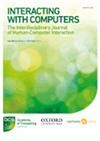探索增强配置文件界面在增强会话体验中的可用性程度
IF 1.3
4区 计算机科学
Q3 COMPUTER SCIENCE, CYBERNETICS
引用次数: 0
摘要
在本研究中,我们研究了如何设计一个可用的增强现实(AR)配置文件会话助手,重点关注如何以及哪些信息导致增强的会话体验和满意度。我们借鉴了可用性实践,包括用户需求访谈、信息处理会议和比较AR配置文件使用和不使用之间的会话体验的实验。我们提供了如何设计用户界面的见解,与现有界面相比,可以增强用户的对话体验和满意度,特别是在AR配置文件上信息的类型,数量和位置方面。三个主要的设计见解是:(1)将主题限制在个人信息,最近发生的事件,偏好和爱好;(2)使用文字卡片形式的表情符号,通过字体大小和放置位置的差异,明确区分喜欢和不喜欢的话题;(三)信息提供页数不超过四页;然而,我们无法解决用户在从AR个人资料中获取他人信息时感到内疚和人为的问题。因此,为了解决这个问题,我们建议将我们的范式从技术解决主义的角度转变为打破技术无所不能的幻想。本文章由计算机程序翻译,如有差异,请以英文原文为准。
Exploring the Extent of Usability for Augmented Profile Interfaces in Enhancing Conversation Experiences
Abstract In this study, we investigated how to design a usable augmented reality (AR) profile conversation assistant focusing on how and which information leads to enhanced conversation experience and satisfaction. We drew on usability practices including user need interviews, information disposition sessions and an experiment comparing the conversation experiences between AR profile usage and non-usage. We provide insights into how to design a user interface that can enhance users' conversation experience and satisfaction compared to existing interfaces, especially in terms of type, quantity and placement of information on the AR profile. The three main design insights are to (1) limit the topics to personal information, recent events, preferences and hobbies; (2) use a text-based card format with emojis and make a clear distinction between preferred and not preferred topics through font size and placement difference; and (3) limit the number of information provision pages to less than four pages; however, we were not able to resolve the problem of the guilt and artificiality users feel in acquiring information about others from the AR profile. Thus, to resolve this problem, we suggest shifting our paradigm from a techno-solutionist perspective to breaking the illusion of the omnipotence of technology.
求助全文
通过发布文献求助,成功后即可免费获取论文全文。
去求助
来源期刊

Interacting with Computers
工程技术-计算机:控制论
CiteScore
2.70
自引率
0.00%
发文量
12
审稿时长
>12 weeks
期刊介绍:
Interacting with Computers: The Interdisciplinary Journal of Human-Computer Interaction, is an official publication of BCS, The Chartered Institute for IT and the Interaction Specialist Group .
Interacting with Computers (IwC) was launched in 1987 by interaction to provide access to the results of research in the field of Human-Computer Interaction (HCI) - an increasingly crucial discipline within the Computer, Information, and Design Sciences. Now one of the most highly rated journals in the field, IwC has a strong and growing Impact Factor, and a high ranking and excellent indices (h-index, SNIP, SJR).
 求助内容:
求助内容: 应助结果提醒方式:
应助结果提醒方式:


